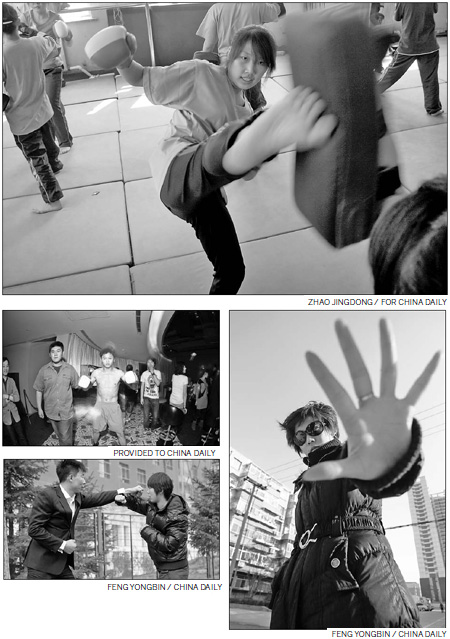Bodyguards in line of hire for more people
Dangerous hours
Private bodyguard services are also coming to the rescue in cases that are outside the remit of public security bureaus.
|
Clockwise from top: Female students training to be bodyguards practice martial arts at a vocational school in Shenyang, capital of Liaoning province; Chai Chang, 25, has worked as a bodyguard in Beijing for more than a year; Two employees of Tianjiao Security in Beijing practice their fighting skills; Zhou Jie (left), 26, from CCG Security in Shanghai, guards a Thai boxer at an event in Shanghai on Oct 27. |
In September this year, a Shanghai man hired guards for his wedding banquet to stop his ex-girlfriend from ruining the event. Although the groom had received threats from the woman, experts say police are powerless to act unless a crime is actually committed.
"When people feel the threat but have no evidence, the authorities can't intervene," said Fang Fulai at Changhang Security, a Shanghai-based firm with about 6,000 employees. "Bodyguards are more experienced in dealing with disputes and can cater to specify needs."
Among the most burgeoning markets for security firms today is lawyers, who often faced with intimidation and violence.
Wu Dong at the Shanghai Bar Association said, although none of his colleagues have hired bodyguards, he knows of several who have been attacked by people involved in cases they are handling.
"We recently accompanied an attorney to a hearing in Jiangsu province," said Cheng Guanyao, a department manager for CCG Security. "The accused had hired people to threaten him and we were there to make sure we got him through the emergency gate safely."
Depending on the quality, security services are relatively inexpensive, with companies offering guards for as little as 100 yuan per hour. However, the more the danger, the higher the price.
Chai Chang raised her right hand to show China Daily reporters a long scar that runs along the tips of three fingers. She received the wound in October after tackling a thief.
"Of course, there are dangers. Otherwise why would people pay us to protect them?" said the 25-year-old, who has worked for Tianjiao Security in Beijing for more than a year. Looking at her scar, she added: "It's only a minor injury. They're common. Some of my colleagues have suffered much worse."
Chai was guarding a 40-year-old Beijing entrepreneur during a business trip to Shenzhen, a city in South China's Guangdong province, and had "sensed someone following us" during a walk by the sea.
"A man ran past and grabbed my client's Hermes handbag," she said. "I ran after him and caught him but he had a knife. I grabbed the blade with my right hand and held him down until the police arrived."
Even after surgery, the feeling in the tips of her fingers has not returned. Yet, she remains philosophical and insisted her job is to risk her well-being to protect someone else's. The salary helps, too.
Chai earns roughly 30,000 yuan a month, more than 10 times the average wage in Beijing, "so we're paid to face danger", she added calmly.
 0
0 







